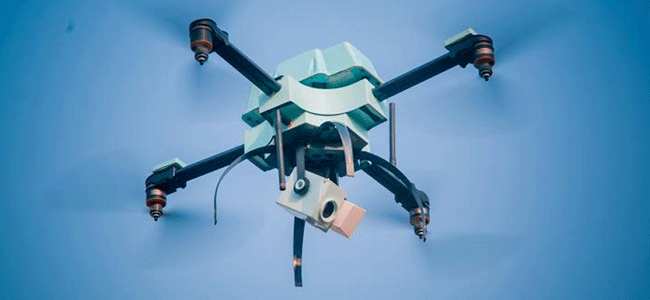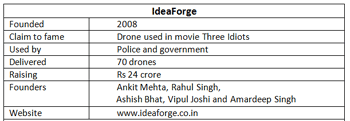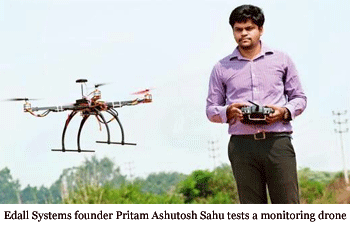
An unmanned aerial vehicle is hovering over a building site of real estate developer Sushil Mantri group in Bangalore. It’s not a mysterious extra terrestrial object, nor is it an unmanned military vehicle, but a civilian drone used by the developer to monitor build quality and take aerial photos of the large complexes they are building.
Drones are now coming closer to you as these unmanned aerial vehicles are being used for civilian purposes by companies like Sushil Mantri group and even the government. The drones are made by Indian companies like Edall Systems, Garuda Robotics, Ideaforge and AirPix, who are busy booking orders. To ramp up capacities for meeting the growing demand for drones, the companies are currently looking for investments.
“We have delivered over 70 drones to many government agencies in India,” says, Ankit Mehta, co-founder of IdeaForge, the Mumbai-based drone manufacturer. The Uttar Pradesh police have been using their quad-motor battery powered drones; but the department would not divulge details on what they were using them for and did not want to comment on their ties with IdeaForge.
Ideaforge and Tata owned Aurora Integrated Systems were the only companies participating in the tenders of the UP government.
 IdeaForge was started by 5 IIT-Mumbai graduates in 2008 and their only source of funding has been a debt of $1 million from the Technology Development Board of India so far. They had also received $100,000 from a set of angel investors during their incubation stage at the IIT-Mumbai.
IdeaForge was started by 5 IIT-Mumbai graduates in 2008 and their only source of funding has been a debt of $1 million from the Technology Development Board of India so far. They had also received $100,000 from a set of angel investors during their incubation stage at the IIT-Mumbai.
Things are looking up in 2014 because they are currently in the process of closing Rs 24 crore from a set of investors led by an ex-Infosyian. After which the money will be used to acquire corporate and government customers and also execute existing orders for the agriculture and civil departments.
These drones are made to order, costing anything over Rs 25 lakh or more depending on the payload, and they have a waiting period of three to four months. The ‘payload’ is nothing but the camera and other sensors that are added other than the material required to fly the drone, which directly impact the flying velocity and takeoff. In simple terms the more the payload the more powerful the batteries have to be.
“We focus on the imagery part of the business; our system can detect humans from thousand metres,” he says. The business model is unique; the company offers services such as data logging and image processing including an annual maintenance fee for the management of these drones. IdeaForge has been cash positive since 2012.
The new entrants
 With demand for drones getting mainstream, over the last two years more entrepreneurs have entered the space. Edall Systems, founded in 2011 by ex-National Aeronautics Limited engineer Pritam Ashutosh Sahu, started as an aviation training facility for drone hobbyists and colleges in Bangalore. The company now has revenues close to Rs 50 lakh and is using the surplus from its education business to create a drone consulting and deployment practice.
With demand for drones getting mainstream, over the last two years more entrepreneurs have entered the space. Edall Systems, founded in 2011 by ex-National Aeronautics Limited engineer Pritam Ashutosh Sahu, started as an aviation training facility for drone hobbyists and colleges in Bangalore. The company now has revenues close to Rs 50 lakh and is using the surplus from its education business to create a drone consulting and deployment practice.
 The company was founded with a capital of Rs 30 lakh funded by Pritam’s savings. His business model is similar to IdeaForge, although they do not manufacture drones. Pritam imports his drones from China and retrofits them with cameras and they are not heavy-duty drones which can be in the air for more than an hour. Currently the drones are being tested with NAL & DRDO and only then will his company revenues from products. Pritam’s drones cost only Rs 5 lakh on an average, and he also leaves the image processing to the user. Currently he is making all his money from training of drone hobbyists, education and consulting services for colleges to build avionics courses into the curriculum.
The company was founded with a capital of Rs 30 lakh funded by Pritam’s savings. His business model is similar to IdeaForge, although they do not manufacture drones. Pritam imports his drones from China and retrofits them with cameras and they are not heavy-duty drones which can be in the air for more than an hour. Currently the drones are being tested with NAL & DRDO and only then will his company revenues from products. Pritam’s drones cost only Rs 5 lakh on an average, and he also leaves the image processing to the user. Currently he is making all his money from training of drone hobbyists, education and consulting services for colleges to build avionics courses into the curriculum.
 AirPix, started in 2012 by four Mumbai college grads, is another company hoping to capitalize on opportunities from the use of drones. Says Aniket Tatipamula, co-founder of AirPix, “Our drone is not yet commercial, because we are making image sensors that can take high resolution pictures of land or a physical structure and imprint them as 3D models on computers in real time.”
AirPix, started in 2012 by four Mumbai college grads, is another company hoping to capitalize on opportunities from the use of drones. Says Aniket Tatipamula, co-founder of AirPix, “Our drone is not yet commercial, because we are making image sensors that can take high resolution pictures of land or a physical structure and imprint them as 3D models on computers in real time.”
He says the company had piloted their drones with a windmill company and provided them with valuable information on the damages on the blades of all the windmills. The entire wind farm of 100 acres could be completely monitored by photographs constantly sent by five drones. The company is planning to create a business model around photography analysis, 3D modelling and annual maintenance contracts, says Tatipamula.
It’s not hardware
The hardware part of drones is not the differentiator but what is valuable are the service and the platform one has built on drone systems. 21 year-old Pulkit Jaiswal along with engineer Mark Yong, from Singapore, have gone on to create enterprise grade drones with a bunch of services added on.
 Their company Garuda Robotics, based in Singapore, has commercially deployed drones for Solar Horizon, a solar panel instalment and maintenance company in Singapore, to monitor the rate of failure of the solar cells.
Their company Garuda Robotics, based in Singapore, has commercially deployed drones for Solar Horizon, a solar panel instalment and maintenance company in Singapore, to monitor the rate of failure of the solar cells.
“We build a platform on top of the drone and add services. The hardware is commoditised,” says Jaiswal, co-founder. Their drones fly over the solar cells on a daily basis and use the camera to detect the damage or rate of damage. They can transfer images from any new generation network such as long term evolution (LTE) and can transfer data to a tablet or a smart phone.
The business model is unique because clients pay for the software and the data processing. His company is now in talks with mining and oil and gas companies. The machines can easily cost more than Rs 40 lakh and Garuda ships the entire drone to the customer along with the battery and the charging stations. The company then integrates the platform on the drone with the tablet or any device. The company’s out of the box thinking has led them to raise $ 1 million of angel funding from unnamed investors.
The Challenges
Even though the opportunity looks attractive, it’s not easy doing the business; one is regulation because the civil aviation ministry does not approve drones to fly over 500 metres if they are to be used by private companies. (In the US, a law was passed in 2012 directing Federal Aviation Authority to throw American airspace wide open to drones by September 30, 2015, which will result in huge opportunities for companies there.)
The second problem is the image resolution, which from 1,000 metres is still dismal. Drone makers have to increase the payload and add turrets to mount powerful cameras, which will increase their size to well over 10 feet, from the current size of 3 feet, because the batteries will have to be powerful to carry the weight.
The batteries can also keep these drones in the air for an hour and they have to be charged for four hours after landing. Added to this is the problem of telemetry; the drone is only as good as recognizing the GPS signal. Such improvements to these will make the drones cost over Rs 60 lakh.
The third problem is the business model itself; there are 900 drone manufacturers in China and over 200 in the USA, one must build expertise in software and services to really make it big in the drone management business. The fourth problem is the funding; investors today have no clue about the benefits of drones other than the publicity pulled by Amazon about drone delivery of retail products, which is not going to happen at least in the next five years. “Hardware services, whether a wearable device or a drone, will not interest investors. The entrepreneurs must think of creating IP in algorithms, add services and create a business model,” says Ivaturi Vijay Kumar, co-founder of Indian Innovation Labs and part of the India Angel Network.
However the signs of a global interest have taken root; in the USA DroneDeploy – a company that manages farms and forests with the help of drones – has raised $2 million recently. EasyJet in the UK is thinking of the possibility of using drones to inspect flights before takeoff; the French Automobile Company Renault has built a concept called the Kwid, which has an assistant drone that will help the car navigate through crowded streets and warn the car of potential threats while driving. A German start-up called Skysense Hangar are building applications to remotely charge drone batteries while on flight which can make drones worker longer hours. It is only a matter of time before we see commercial drones supplement citizen services in India.